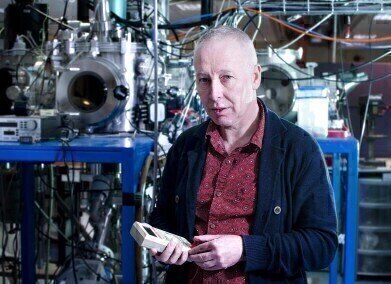-
 Professor Paul Maguire
Professor Paul Maguire
News
Radical research could revolutionise airborne bacteria detection
Apr 08 2013
Scientists in the School of Engineering at the University of Ulster, Jordanstown are to explore the possibility of developing a portable, compact device that could immediately diagnose pathogens such as hospital superbugs, following funding worth £600,000 from the Engineering and Physical Sciences Research Council (EPSRC).
The joint, three-year, research project in collaboration with the University of Glasgow is worth £1m in total and if successful, may also transform the detection of pathogenic warfare agents such as anthrax and even extra-terrestrial life.
Professor Paul Maguire from the University’s Engineering Research Institute said: “We are looking at quite radical approaches to the serious challenge of instant or almost instant pathogen detection. Instead of trying to identify airborne bacteria by their microbiological properties alone, we will be also look at their precise physical structure in the hope that this would allow us to separate different strains of the target bacteria and become the basis for a rapid detection and early warning system.
“At present, standard laboratory culture techniques can require up to 48 hours delay for pathogen identification. Our multidisciplinary team includes physicists, microbiologists and electronic engineers who will be working on building a small proof of principle device to constantly monitor the air and issue an instant warning when it identifies the target bacteria it has been pre-programmed to detect.
“The ongoing threat of pathogenic agent dispersal, whether chemical, nuclear or biological is a priority for governments worldwide. The static detection systems, set up in the USA in the wake of 9/11 can still take between six and 48 hours to identify a pathogen. Portable, compact, immediate, early-warning technology could limit the impact and greatly assist the management of any threat” he added.
Regarding development timescales Professor Maguire added; “The theories that this research is based on have never been developed before and often radical scientific ideas can take up to 20 years to work, however, we will be trying to do things a bit quicker than that. We have three years to build a prototype and prove that identifying airborne pathogens by their physical properties will work."
Digital Edition
Lab Asia Dec 2025
December 2025
Chromatography Articles- Cutting-edge sample preparation tools help laboratories to stay ahead of the curveMass Spectrometry & Spectroscopy Articles- Unlocking the complexity of metabolomics: Pushi...
View all digital editions
Events
Jan 21 2026 Tokyo, Japan
Jan 28 2026 Tokyo, Japan
Jan 29 2026 New Delhi, India
Feb 07 2026 Boston, MA, USA
Asia Pharma Expo/Asia Lab Expo
Feb 12 2026 Dhaka, Bangladesh


















